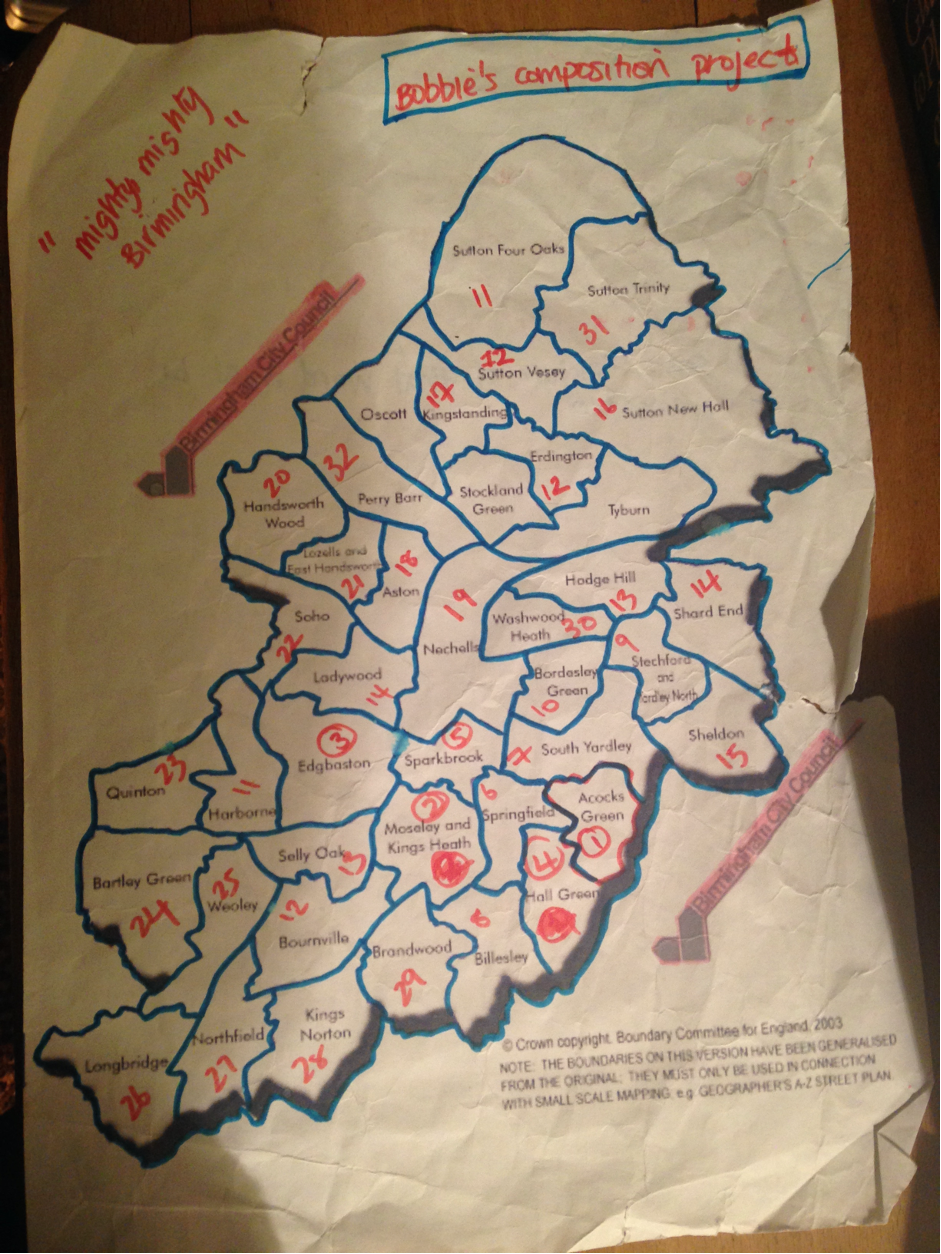for-Wards: Pilot Project
The for-Wards pilot tested the feasibility of the curatorial and compositional methods I wanted to develop and employ in fieldwork. Based at Royal Birmingham Conservatoire (RBC), the pilot project took place from October 2014 to March 2015. I invited Birmingham residents to share in the creative process of composing three new musical works about three Birmingham electoral wards (Aston, South Yardley and Sparkbrook) in collaboration with three Birmingham based composers (myself, Kirsty Devaney and Sebastiano Dessaney). In order for the new music to be easily accessed by the communities in their localities, the for-Wards pilot culminated in a tour of three library spaces located in the three Birmingham wards in which the communities were based. Birmingham Central Library was chosen as an additional fourth performance space with the intention of opening up these works to a larger audience.
The for-Wards pilot demonstrated the success of the proposed approach through the completion of the three commissions and generated a generally positive response from audiences and local press. I also received generous encouragement from a passionate member of the audience, Lee Fisher, to realise the citywide vision. Fisher later became an artistic partner in the for-Wards citywide programme. A high number of community collaborators returned to hear the new music which they had co-created.
Findings from the pilot evaluation, whilst broadly positive, offered insightful feedback relating to the choice of ensemble instrumentation (flute, clarinet, trumpet, cello, double/electric bass, and electronic samples) for the three newly composed works. Audience members noticed how the ensemble was quite restrictive in sonically describing the three neighbourhoods in each of the three wards. There were also stylistic comments about how all three collaborating composers were RBC post-graduate students or alumni, and although different in our compositional approaches, each of us drew upon influences prevalent in current contemporary classical compositional practice.
for-Wards: Background
for-Wards sprang from a personal desire to learn more about the city in which I was born and raised. After time spent working abroad and studying in London, I realised I knew more about the geographical makeup of the capital than I did about Birmingham and sought to address this through composition.
I started out working independently, with the intention of composing forty short works through the lens of my own perception of each of Birmingham’s forty electoral wards (since expanded to sixty-nine following a boundary review in 2018). This approach has precedence in the work of Sufjan Stevens’ project The Fifty States (2003–2009), in which Stevens set out to compose an album for each state of the USA. The project was ultimately unsuccessful, with Stevens only releasing two of the projected fifty albums in a six-year period before writing the project off. In an interview with Paste Magazine, he states, ‘The whole premise was such a joke […] I started to feel like I was becoming a cliché of myself.’ (Jacobs, 2009).
Keen to avoid the logistical and creative over-stretch that hampered Stevens’ project, I decided to establish a creative team to realise the project, involving community groups from each ward in the compositional process, and to use this process to establish some parameters for community composition projects more broadly. As iterations of the team developed, Harun Morrison, then joint artistic of Fierce Festival, described my approach to community composition as ‘hyperlocal’, a term borrowed from media to describe news and community interest platforms that serve a highly specific geographical area. From the very earliest stages of my project, I have considered the concept of the hyperlocal, and questions about how this can be represented in compositional practice, to be absolutely central to this project.
In response to this feedback, and to fulfil the original aim of creating new music in response to the entire city of Birmingham, the project idea was revised and developed further. To realise the for-Wards citywide ambition I recruited a team of ten composers (each a Birmingham native or Birmingham-based) to work with forty community groups (four apiece) located in the ten constituencies which make up Birmingham (each district is made up of four wards resulting in four community groups collaborating with each composer). It was integral that the recruitment of the ten composers (one being myself) showcased a broader and more varied range of Birmingham’s musical compositional talent. I decided that a multi-genre, diverse team of composers supported through a network of regularly funded and independent music organisations and venues dedicated to programming and showcasing new music in the city was paramount. This led to the involvement of the for-Wards Artistic Partners. A full list of partners can be found here, and the process of building this network is discussed below.

